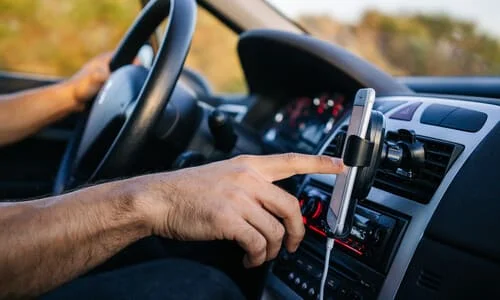 In recent years, ride-sharing services like Uber and Lyft have revolutionized the way we commute. These convenient platforms connect drivers with passengers while offering a flexible, cost-effective transportation solution. However, with the increasing popularity of ride-sharing, it’s important to understand the insurance coverage available for rideshare accidents.
In recent years, ride-sharing services like Uber and Lyft have revolutionized the way we commute. These convenient platforms connect drivers with passengers while offering a flexible, cost-effective transportation solution. However, with the increasing popularity of ride-sharing, it’s important to understand the insurance coverage available for rideshare accidents.
Unlike traditional taxi services, rideshare drivers use their personal vehicles, which can blur the lines between personal and commercial use. This unique aspect poses challenges when it comes to insurance coverage. In the event of a car accident during a rideshare trip, determining who is responsible for covering the damages can be a bit complicated.
To ensure you are adequately protected, it’s essential to be aware of the different types of insurance that may come into play in rideshare accidents. Understanding these options will help you make informed decisions and navigate the potential complexities that may come with these claims and coverage.
Of course, if you find yourself filing a claim — or fighting to secure the compensation you’re owed for any damages — your best bet will be to work with an experienced Fresno car wreck lawyer. At Singh Ahluwalia Attorneys at Law, we can help you review all your options in a no-obligation, free case review. All you have to do is call (559) 878-4958 or contact us online to schedule your first appointment.
What Is the Best Insurance for Ride-Sharing?
When it comes to ride-sharing, the best insurance coverage depends on several factors that come into play along the different stages of a ride. Understanding these factors will help you determine the most suitable insurance options for your ride-sharing activities.
Stage of Ride
The stage of the ride, i.e. whether the driver is offline, online waiting for a ride request, or en route to pick up a passenger, can significantly impact insurance coverage. Different insurance policies may apply depending on the specific stage, so it’s essential to understand these distinctions.
Ride-Sharing Platform Policies
Ride-sharing platforms such as Lyft and Uber have their own insurance policies in place to protect drivers and passengers. These policies typically provide coverage while the driver is actively using the app and transporting passengers. However, coverage may vary during different stages of the ride. It’s crucial to familiarize yourself with the ride-sharing platform’s specific policies so you can make sure you fully understand the extent of coverage provided.
Personal Insurance Coverage
Your personal auto insurance policy also plays a role in covering ride-sharing accidents. However, personal auto insurance policies generally exclude coverage for commercial activities like ride-sharing. This means that if you rely solely on your personal insurance policy, you may not be adequately protected during the ride.
To address this gap, some insurance providers offer rideshare-specific coverage as an add-on to personal auto insurance.
What Is Commercial Rideshare Coverage?
Commercial rideshare insurance is a specialized insurance coverage designed specifically for drivers who engage in ride-sharing services. This type of insurance provides additional protection beyond personal auto insurance policies and is often offered directly by the ride-sharing company itself, such as Lyft or Uber. Let’s delve into the key features of commercial rideshare insurance:
What Is the Purpose of Commercial Rideshare Insurance?
The primary purpose of commercial rideshare insurance is to bridge the gap between personal auto insurance and the unique risks associated with ride-sharing. It is designed to provide coverage during the time when a driver is actively using the ride-sharing app for accepting ride requests and transporting passengers.
How Does Coverage Work When the Driver is Using the Rideshare App?
Commercial rideshare insurance typically offers coverage during the period when the driver is online and available to accept ride requests. This coverage includes liability protection for injuries or property damage to third parties caused while the driver is actively engaged in ride-sharing activities.
Reduced or Limited Coverage
It’s important to note that commercial rideshare insurance coverage may be reduced or limited during certain periods. For instance, coverage might be reduced when the driver is online but has not accepted a ride request yet; or is waiting to pick up a passenger.
During these times, the ride-sharing platform’s insurance policy may provide less coverage compared to when the driver is actively transporting passengers.
Is A Driver Required To Use Their Personal Insurance First?
In most cases, ride-sharing companies will require drivers to attempt to use their own personal auto insurance before relying on the company’s commercial rideshare insurance coverage.
This means that if you are involved in an accident while driving for a ride-sharing service, you may need to file a claim with your personal insurance provider initially. Only if your personal insurance denies the claim (or provides insufficient coverage) will you then turn to the commercial rideshare insurance offered by the ride-sharing platform.
What Is Rideshare Driver’s Insurance?
Rideshare driver’s insurance is a type of coverage specifically tailored to cover the personal vehicles of drivers who use ride-sharing services. While commercial rideshare insurance is often provided by the ride-sharing companies themselves, rideshare driver’s insurance is available from certain insurance providers.
This type of insurance is designed to bridge coverage gaps that may be left by a standalone auto insurance policy, and offers specialized protection for accidents that occur during ride-sharing activities.
For example, these kinds of policies are crafted to provide coverage during the different stages of ride-sharing, including periods when the driver is online and waiting for a ride request, en route to pick up a passenger, or transporting passengers.
If your insurance policy is not rideshare-specific, there is a chance that the insurer may deny coverage for accidents that occur while you are driving for a ride-sharing service. This is because personal auto insurance policies typically exclude coverage for commercial activities.
What About My Personal Auto Insurance?
In addition to commercial rideshare insurance and rideshare driver’s insurance, your personal auto insurance policy can play a role in covering ride-share accidents. Here’s a closer look at how your personal insurance may come into play:
Coverage for Injuries
If a rideshare driver sustains injuries during a ride, they may be able to rely on their personal insurance coverage. If you have Medical Payments Coverage (MedPay) as part of your personal auto insurance policy, it can help cover medical expenses resulting from the accident.
Uninsured/Underinsured Motorist Coverage
If you were driving your vehicle while engaged in ridesharing and were involved in an accident with an uninsured or underinsured driver, your personal auto insurance’s uninsured/underinsured motorist coverage may come into play. This coverage can help protect you if the at-fault driver does not have sufficient insurance coverage to compensate for your injuries or damages.
Using Your Own Insurance as a Last Resort
While your personal auto insurance may provide some coverage in certain scenarios, it’s important to note that using your own insurance should generally be considered a last resort.
Personal auto insurance policies are typically not designed to cover accidents that occur during commercial activities like ride-sharing. As a result, relying solely on your personal insurance will probably lead to coverage gaps and potential claim denials.
How Will a Rideshare Accident Affect My Personal Auto Insurance Policy?
Most personal auto insurance policies have exclusions for commercial activities like ride-sharing. If your policy explicitly excludes coverage for accidents that occur during ride-share activities, your insurance company may deny your claim related to the accident.
Additionally, if you are involved in an accident while driving for a ride-share company, you may be required to report the incident to your personal auto insurance provider, even if they won’t cover the damages. Failure to report the accident could potentially lead to issues with your policy in the future, such as non-disclosure of relevant incidents.
Then, even if your personal auto insurance policy covers the accident, filing a claim for a ride-share-related accident could result in a premium increase. Insurance companies consider factors such as the frequency of claims and the higher risk associated with commercial activities when determining premiums.
In the very worst cases, your insurance company may choose not to renew your policy if they discover that you regularly engage in ride-sharing activities. This can occur if your policy explicitly prohibits commercial use or if your insurance provider determines that the level of risk associated with ride-sharing is not within their underwriting guidelines.
When Would Another Driver’s Insurance Cover the Accident?
If another driver or individual causes an accident while riding in your ride-share vehicle, their liability insurance should come into play. The responsible party’s insurance coverage is intended to provide compensation for injuries and damages resulting from their own actions.
Otherwise, in some cases, the accident may have been caused by both parties. In these situations, where the drivers share fault, California’s comparative negligence system will allow the drivers to split the cost of damages.
When this happens, the determination of fault and the distribution of liability can become more complex. However, the liability insurance of the responsible party should still cover their portion of the damages.
Work With Experienced Rideshare Accident Lawyers
After being involved in a car accident, whether as a driver, a passenger, or an occupant in rideshare vehicle, you’ll want to reach out to a qualified car accident attorney to ensure that your rights are protected. Our team at Singh Ahluwalia Attorneys at Law can help you navigate all of the complications that come with a rideshare accident and even help you deal with intimidating insurance companies.
To contact one of our qualified attorneys today for a free consultation, simply call (559) 878-4958 or contact us online to schedule your first appointment.


